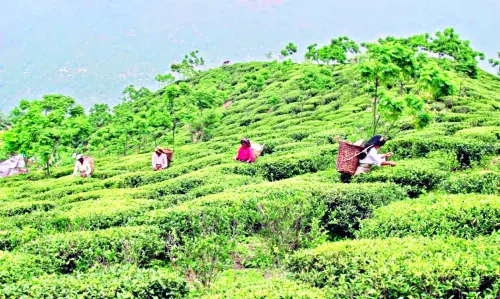Compared to last yr, tea output in North Bengal falls by nearly 60%

Alipurduar: Tea production in the plains of North Bengal has slumped drastically this year, prompting fresh calls for the introduction of a Minimum Support Price (MSP). Compared to last year, output in October has declined by nearly 50 to 60 per cent, raising alarm across the region’s tea belt.
Industry sources blame erratic weather, poor infrastructure, flood damage and falling market prices for the steep drop. Preliminary data from the Dooars branch of the Indian Tea Planters’ Association (ITPA) shows that of the 21 tea estates surveyed up to October, 18 reported reduced production, with many recording losses of 40 to 50 per cent.
The Subhashini Tea Estate in Alipurduar’s Kalchini block suffered the worst blow, with production down by around 58 per cent due to severe flood damage in October. Other estates, including Srinathpur and Saili in Jalpaiguri, Birpara and Dimdima in Alipurduar and Mainak Hill Tea Estate in Cooch Behar, also reported substantial declines.
Citing mounting distress, members of the ITPA have unanimously demanded an MSP and submitted nine key proposals to the Chief Minister. These include the repair of river embankments, infrastructure development and government support to keep the struggling sector afloat.
“It is absolutely essential now to fix a Minimum Support Price for tea. The industry cannot survive unless the government intervenes,” said Ram Avatar Sharma, Secretary of the ITPA’s Dooars branch. “With production halted from December to February, managing operations has become extremely difficult.”
Both September and October are considered crucial months for tea production—particularly the “Puja flush” period. However, many estates have failed to meet their targets this year. Planters fear that if production shortfall and falling prices continue in tandem, the industry could face a severe financial crisis in the coming season.
“There is a serious problem in the tea auction market. Prices have dropped sharply compared to last year,” said Rajkumar Mondal, Chairman of the Dooars Branch Indian Tea Association (DBITA). “Coupled with erratic weather, it’s impossible for estates to absorb such heavy losses.”



